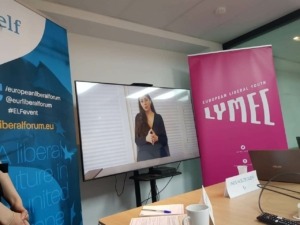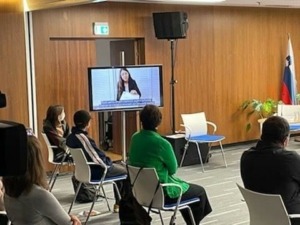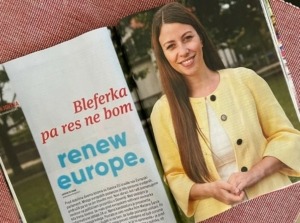Today, on 24 November 2021, MEPs discussed fundamental freedoms and the rule of law in Slovenia, in particular the complications around the appointment of European Delegated Prosecutors.
“If you criticise, attacks will follow. Either there is subordination or destruction. Either you support this government or you must leave. Either you belong to them or — basically —be careful.” These are the words MEP Irena Joveva used to open her debate on Slovenia. She underscored that deviations from democratic norms reach beyond national boundaries and become a problem for the Union, as was illustrated by the examples of Poland and Hungary.
In October, a delegation from the Committee on Civil Liberties, Justice and Home Affairs of the European Parliament examined the state of the rule of law and democracy in Slovenia, and in particular expressed concern about the non-appointment of European Delegated Prosecutors and the non-payment of services provided by the Slovenian Press Agency (STA). “The current Slovenian Government has recently yielded to pressure, mainly from the EU. They released STA funding, after almost a year of manipulation. They took note of the names for the European Delegated Prosecutors, after more than a year of legal farce.’ But the MEP warned that the financial difficulties of the STA were not resolved, as the contract for next year has not yet been concluded. And in the case of prosecutors, she believed that the decision on temporary nomination made a mockery of independent institutions.
Joveva notes that the Government’s relenting is only feigned and that pressure has been mounting elsewhere. “There are attempts to subordinate, silence or smear the prosecutors, the judiciary, the police, the media, NGOs, the independent, and regulatory agencies. In this, they use all means available.” In the communication of the ruling structures there lurks the desire to destroy institutions, conspiracy theories about communists are used as a cover for corruption and clientelism. “This is not about defending traditional values. It is about negating them,” said the MEP. She concluded her address by asking:
“Our institutions have managed to withstand so far on account of a rich democratic tradition and the integrity of individuals. But for how much longer? Where are strong, specific responses? When will you learn that the situation in one Member State affects the whole of the EU?”
The Renew Europe group also expressed growing concern about the political situation in Slovenia. After half a year of delay, the Slovenian Government has now nominated two national prosecutors to the European Public Prosecutor’s Office (EPPO), operational since 1 June 2021. Nevertheless, the group remains deeply concerned about the Government’s political interference in the process of appointing the prosecutors. Prime Minister Janez Janša dissolved the previous appointment. The group wrote that it could not tolerate a Member State intervening and undermining the function of an EU judicial body. For that reason, the group’s Members request answers from the Slovenian authorities.
Unfortunately, this is not the only example of worrying backsliding on the rule of law, as was also pointed out by Joveva:
“The Government’s aggressive attempts to seize control over independent media and the Prime Minister’s attacks on journalists and political opponents on social media shows that press freedom and fundamental rights are also at risk. The European Commission must act to immediately stop the attempts of Janez Janša’s Government to politicise key democratic institutions and challenge press freedom.”



 In the interview, a large part of the discussion revolves around the state of media freedom in Slovenia, from party funding of media that run propaganda aimed exclusively at discrediting political opponents, and the fact that the European Commission and the European Parliament’s working group are closely monitoring the situation.
In the interview, a large part of the discussion revolves around the state of media freedom in Slovenia, from party funding of media that run propaganda aimed exclusively at discrediting political opponents, and the fact that the European Commission and the European Parliament’s working group are closely monitoring the situation. The MEP also discussed her activities in the first half of her term and future plans. She participated in more than a dozen reports and in a narrow focus group, where proposals for the European Parliament reforms were prepared on a proposal from President David Sassoli. He is currently focusing on the media, culture, environment, health and youth issues, focusing on meeting people’s expectations.
The MEP also discussed her activities in the first half of her term and future plans. She participated in more than a dozen reports and in a narrow focus group, where proposals for the European Parliament reforms were prepared on a proposal from President David Sassoli. He is currently focusing on the media, culture, environment, health and youth issues, focusing on meeting people’s expectations.